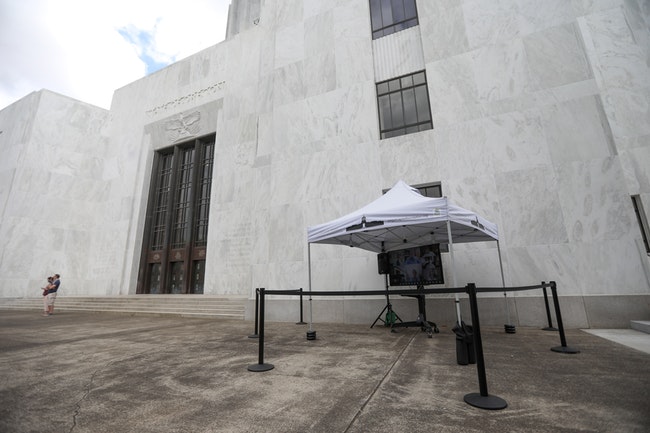 A flat-screen TV and speaker livestream a committee meeting outside of the Oregon State Capitol on Thursday, August 6. (Amanda Loman/Salem Reporter)
A flat-screen TV and speaker livestream a committee meeting outside of the Oregon State Capitol on Thursday, August 6. (Amanda Loman/Salem Reporter)
Oregon legislators will meet on Monday to shore up a state budget decimated by the coronavirus pandemic.
Gov. Kate Brown called the second special session of the year to address the $1 billion hole in the current two-year budget.
Oregon’s current two-year budget puts the general fund at $22.4 billion, about a quarter of the total $85.8 billion state budget. Policymakers have been considering what combination of savings, reserves and cuts to use since a dismal forecast about sharply dropping tax revenues was issued in May.
Decisions that lawmakers make next week will affect social services, schools, parks and provides jobs for tens of thousands particularly in the Salem area.
The spending plan advanced by legislative budget writers will delay new programs expected to start in the next 12 months, keep empty jobs vacant, shut two state prisons and otherwise reduce state services.
The plan also calls for a bit of a tax increase, taking Oregon away from federal cuts created by the federal CARES Act earlier this year. According to a staff report, doing so would add $118 million in revenue for the current budget cycle.
Tom Powers, caucus administrator for the majority Senate Democrats, said that the plan is now being converted into legislation.
State Sen. Denyc Boles, a Salem Republican who sits on the budget committee, said she was unsure what the plan would do to the state’s workforce.
“It’s hard for me to answer that because we’re not going to see final budget bills until Sunday night, which is pretty frustrating,” she said.
She said that the lack of information on a session that’s about to begin is unfair to the public.
She said that she’ll be watching to see how the budget affects her constituents. Boles said she is concerned with plans to close Shutter Creek Correctional Institution in North Bend and Warner Creek Correctional Facility in Lakeview.
Boles said those closures might lead to more crowding in Salem prisons when there are already concerns about packed prisons during the pandemic.
Closing Shutter Creek would save $3.2 million, plus an additional million in administrative and rehabilitation services, according to budget documents, which didn’t have details on savings associated with Warner Creek.
Other proposed cuts include a $1.2 million anti-poaching campaign sponsored by the state Department of Fish and Wildlife, and $1.1 million in fire protection equipment for the state Department of Forestry.
County fairs, grants for drug-abuse programs and invasive species program and others could also be cut.
State Rep. Raquel Moore-Green, R-Salem, said in an email that cuts should be distributed across the state and agencies. She said cutting the two prisons would hurt rural Oregon.
“I applaud not filling vacancies as one way to save money. However, we should find additional ways to balance the budget,” she said.
She also called for maintaining funding for police, mental health services and the state Employment Department. Budget documents identify a possible $6.8 million in possible cuts to services and supplies.
Rep. Bill Post, R-Keizer, suggested cuts in state IT projects, rail services and the state library as ways to save money. In an email exchange, he pushed back against a proposed $7.3 million cut to the Department of Education’s farm-to-school food program.
In a letter to a Ways and Means subcommittee, he said that the Champoeg Creek Farm in St. Paul began in 2019 selling poultry to Portland Public Schools.
“With our economy at an all-time, access to local and nutritional meals are an absolute necessity,” he said.
State Sen. Kim Thatcher, R-Keizer, said in an email that she was also concerned about the closure of the two correctional facilities and the Legislature should prioritize public safety, health and education.
“Making adjustments to the state budget is about making choices,” she said. “Legislative leaders could choose to offset any potential job losses by freezing salaries, pending raises or other options.”
There have been calls for the Legislature to consider proposals shielding employers from legal liability if workers or customers become sick with the virus, as well as police reforms.
Senate Republican leader Fred Girod, R-Stayton, has said that the Legislature should not take up such policy matters during the session.
As of Friday, it was unclear if they would be considered and how long the session would last.
“Special sessions are really driven by the presiding officers,” said Powers.
Senate President Peter Courtney, D-Salem, and House Speaker Tina Kotek, D-Portland, did not respond to requests for comment on Friday.
SUPPORT ESSENTIAL REPORTING FOR SALEM – A subscription starts at $5 a month for around-the-clock access to stories and email alerts sent directly to you. Your support matters. Go HERE.
Contact reporter Jake Thomas at 503-575-1251 or [email protected] or @jakethomas2009.









